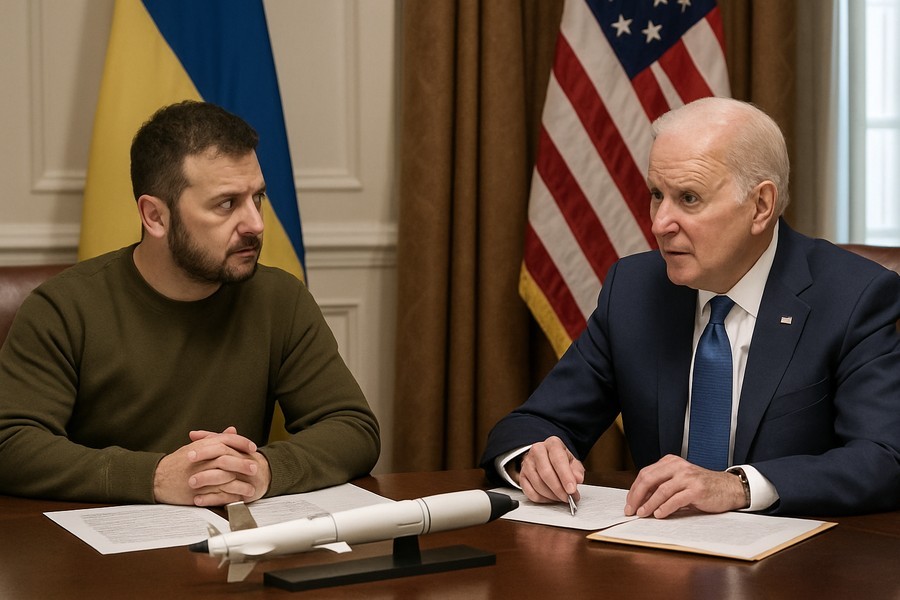
Presidential Meeting to Discuss Missile Support
Ukrainian President Volodymyr Zelensky is set to have a sit-down with the US President in Washington. The focus of their discussion will be the potential aid to Ukraine in the form of Tomahawk missiles, powerful enough to reach deep into Russia.
This meeting follows a recent conversation between the US President and his Russian counterpart, Vladimir Putin. The two leaders had a productive phone call, which ended with plans for a face-to-face meeting in Hungary.
Zelensky's Third Visit and the Tomahawk Question
This will be Zelensky's third trip to the US this year, during which he will likely express Moscow’s urgency to resume dialogue once they hear about potential Tomahawk availability. Zelensky has been vocal about his desire for the US to equip Ukraine with these advanced missiles, which have an impressive range of 2,500 km (1,500 miles).
When asked if the US President was considering providing Ukraine with Tomahawks, he replied, "We'll see... I may." However, after his conversation with Putin, he expressed concern over depleting the US's Tomahawk cache, as America needs them too.
Trump and Putin's Trade Talk
Following his call with Putin, the US President shared that they spent a significant amount of time discussing potential trade between Russia and the United States once the conflict with Ukraine concludes. He also noted that high-ranking advisors from both countries would meet at an undisclosed location the following week, led by the Secretary of State. The US President plans to update Zelensky on these discussions during their meeting.
The US President anticipates meeting Putin in Hungary within the fortnight. While he has previously shown sympathy towards Russia, he has recently taken a more stringent stance towards Putin.
Failed Peace Talks and Future Plans
A previous attempt to push Putin towards peace talks, during a face-to-face summit in Alaska, did not result in a significant breakthrough. Despite this, the US President remains hopeful about meeting Putin in Hungary and working towards a resolution.
Meanwhile, Putin held a conversation with the Hungarian Prime Minister, during which he shared details of his call with the US President. The Hungarian leader agreed to assist in organizing the potential summit in Budapest and expressed his hope for peace.
Increased Tensions and Attacks
Just hours before the US-Russian phone call, Russia launched a significant attack on Ukraine, involving 28 ballistic missiles and 320 drones. The US's ambassador to Ukraine described these attacks as indicative of Moscow's true approach to peace talks. She suggested a combination of tougher sanctions, enhanced air defense, and the provision of long-range capabilities as an effective response.
Although the US President hinted that he might send long-range Tomahawk cruise missiles to Ukraine, he later expressed concern over depleting the US's arsenal. Currently, Ukraine's navy lacks the necessary ships to operate these missiles, and the US has a limited number of launchers required for the missiles, typically mounted on ships and submarines.
Escalation Concerns and Strained Relations
The idea of the US sending Ukraine long-range Tomahawk cruise missiles has caused trepidation. Such a move would be seen as a significant escalation. During his presidential campaign, the US President promised a quick resolution to the conflict in Ukraine. However, he later acknowledged the difficulty of this task.
Relations between the US President and Zelensky have been strained, most notably highlighted when the US President and Vice-President criticised Zelensky on live television. However, their relationship has improved significantly in recent months.
In a significant change of stance, the US President expressed hope that Kyiv could reclaim all of Ukraine, contrasting with his previous calls for Kyiv to surrender territory occupied by Russia. The US President also warned Putin of severe sanctions if he did not agree to a ceasefire within a short timeframe. However, the threat was not carried out after Putin agreed to meet the US President in Alaska.
Global Sanctions and Diplomatic Doubts
Recently, doubts were raised about a claim by the US President that the Indian Prime Minister had agreed to stop buying Russian oil. An Indian government spokesperson denied awareness of such a conversation. The US has been urging countries, especially India, China, and NATO members, to stop purchasing Russian energy to exert economic pressure on the Kremlin. Zelensky has also repeatedly supported these calls.
